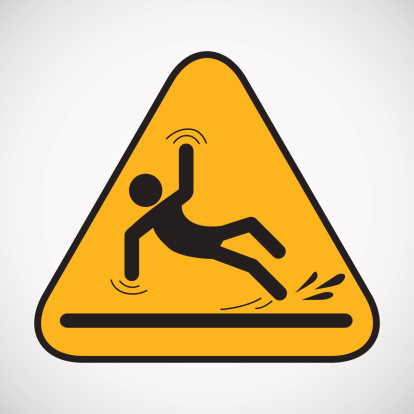How the standard of a “reasonable person” applies to slip and fall injuries
 Do you consider yourself a clumsy person? Are people always remarking on how you always seem to find a way to slip, trip, fall, spill, or break something?
Do you consider yourself a clumsy person? Are people always remarking on how you always seem to find a way to slip, trip, fall, spill, or break something?
It is true that some individuals just seem to be unlucky this way. But it is extremely important not to let your conception of yourself (or others’ conception of you) as a clumsy person interfere with your decision to seek compensation for injuries suffered due to defects in someone else’s property.
In other words, do not be quick to assume the accident was all your fault. Instead, it is best to assume it was not all your fault and immediately document the scene of the accident and your injuries. This will enable you to turn to a personal injury attorney for a professional assessment of your ability to hold the property owner liable for your injuries and receive compensation for your suffering.
Understanding the “Reasonable Person” Test
Of course, property owners cannot make their properties 100 percent accident-proof. Nor are they expected to under the law. What they are expected to do is maintain their properties in such condition that a “reasonable person” would be able to avoid injury.
So who is this “reasonable person” anyway?
The “reasonable person” is actually not based on any real person at all. It is an ideal created to help juries compare an injured victim’s behavior to the behavior of an average person. The “reasonable person” is assumed to be alert to their surroundings and able to act with ordinary prudence to avoid open and obvious hazards.
The “reasonable person” does not share the injured person’s intelligence or personality—so the fact that an accident victim might be of low intelligence or chronically careless does not affect the standard to which the property owner will be held. However, the “reasonable person” does share any knowledge that the victim had or that would be common sense—such as the fact that it was raining, which could make pavement slippery, or the fact that a sign was present warning of a dangerous condition.
Understanding Comparative Negligence
Even if you have an accident in a situation where a “reasonable person” probably could have avoided injury, you may not need to give up on the possibility of compensation entirely. In California, more than one party can share liability for an accident under the doctrine of comparative negligence.
So if, for example, you were running down an aisle of the supermarket and slipped and fell on a wet floor, you might be assigned partial liability on the grounds that running in the store was a bit reckless and unsafe. However, the store still should have had a wet floor sign up. Your behavior does not change this fact. In this case they would probably bear the larger portion of liability and you should be able to secure compensation.
Questions?
Remember, the best way to tell if you have a strong case for compensation following a slip and fall accident or other type of accident is to consult an attorney. Your attorney will be able to distinguish between accidents caused entirely by your own clumsiness or recklessness and accidents in which the property owner had a role.




